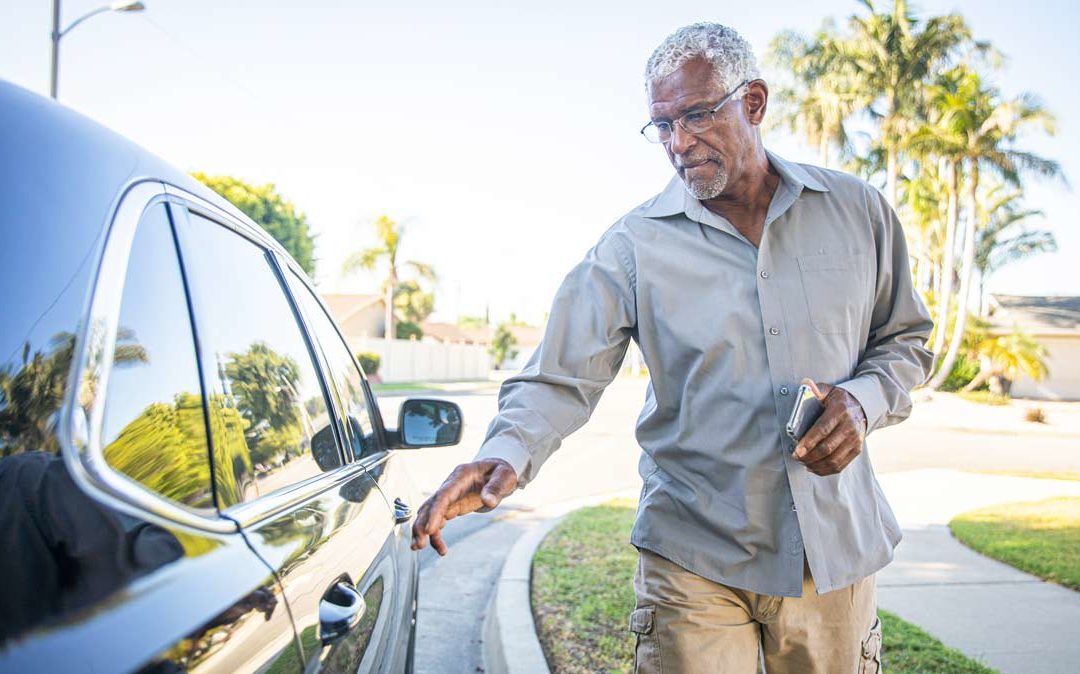Industry experts reveal what is being done to keep riders healthy and offer tips on how to protect yourself.
At this stage of the coronavirus pandemic, anyone who doesn’t have an essential reason to leave the house should be staying home. But what if you still need to travel and don’t have a car of your own? Your options are limited: It may be difficult to keep your distance on public transit, which could also be operating at reduced frequencies, and not everyone can use rental bikes or scooters.
Ride-hailing services, such as Uber and Lyft, may seem like good alternatives. Along with taxis, they continue to operate where local authorities allow. Those who have a driver’s license and a place to park have even more options, because rental cars and shared vehicles are still available—and may be more affordable than ever.
But shared vehicles present unique risks when it comes to protecting riders and drivers.
Scientists say that the novel coronavirus is most likely to spread as a result of close contact, such as being directly coughed on or sneezed on by someone with the virus, or being within 6 feet of an infected person for 10 to 15 minutes or longer. And not all carriers of the virus exhibit symptoms. This makes traveling in a car with someone else riskier than traveling alone. The virus can survive on surfaces for hours or even days, too, so it’s important that vehicles used at various times by multiple people are kept clean.
CR spoke with experts in the ride-sharing, taxi, and rental car industries and found out what sort of precautions they’re taking. For example, some cab companies told us they’re investing in heavy-duty cleaning equipment, and car-sharing services are introducing contactless pickup.
There also are additional steps you can take to minimize your own risks, such as requesting or looking for a taxi or other chauffeured car with a partition between the driver and passengers, instead of a typical Uber or Lyft that doesn’t have one. Or you could rent a car that you can thoroughly clean yourself, provided you have a place to park. And, of course, anyone leaving the house should follow new recommendations for wearing a mask, no matter their method of transportation.
Uber, Lyft, and Ride-Hailing Services
Although Uber and Lyft continue to operate in most areas, the companies have discontinued rides shared between passengers who do not know each other, such as UberPool and Lyft Line. Individuals and families can still call a car from the Uber or Lyft apps, but that doesn’t mean they should.
“Honestly, I would recommend that people do not take Uber and Lyft right now,” says Harry Campbell, founder and CEO of The Rideshare Guy, a blog and podcast dedicated to ride-hailing services.
Campbell says that because the responsibility to clean cars is left up to individual drivers, riders may not know how well the car they’re taking has been cleaned. “Some drivers are doing a great job, but others are not,” he told CR.
Lyft told CR that it is instructing its drivers to open windows during trips to increase air circulation, to ask passengers to sit in the rear seat, and to use disinfecting wipes to clean frequently touched surfaces. When it comes to that last recommendation, drivers are largely responsible for paying for these supplies on their own, Campbell says, and they are dealing with the same supply shortages as the rest of us.
On its website, Lyft says that it is providing cleaning supplies to drivers through its service centers, but when we looked into the availability of these supplies, CR found that no service centers in the state of New York are currently offering cleaning products, and that similar situations exist in other states.
“We are monitoring the COVID-19 situation closely, and taking action based on guidance from the Centers for Disease Control,” Lyft spokesperson Dana Davis told CR in a written statement. “Our focus is on keeping our riders, drivers, and team members safe. We have an internal task force dedicated solely to this issue and will continue to take action as needed.”
Uber did not respond to CR’s requests for comment, but Andrew Macdonald, the company’s senior vice president for global rides and platform operations, said in a tweet that Uber had acquired 30,000 bottles of disinfectant that it was sending directly to drivers. Macdonald said that not every driver would be able to get a bottle, and that the priority was to supply “the most active drivers in a few cities,” including New York.
Even more important than the cleanliness of the cars used for Uber and Lyft is the health of the people who drive them, says Campbell, the founder of The Rideshare Guy.
“The CDC recommendation is to stay 6 feet away from someone, but when someone gets into the back of your car, it’s pretty much impossible to follow that rule,” he says.
And if a driver gets sick, there’s a chance he or she can spread it to passengers, and vice versa. Currently, Uber and Lyft have started providing financial relief to drivers who are unable to work due to a COVID-19 diagnosis or quarantine order, but the virus can also be transmitted by those who aren’t showing symptoms of the disease.
Because drivers get paid only for the trips they take, drivers who may suspect they’ve been exposed to COVID-19 but who still feel healthy or aren’t displaying symptoms might choose to continue working, Campbell says.
“You’re supposed to stay home from work. But as a driver, if you do that, you don’t get paid,” he says. “None of these drivers are out there maliciously trying to spread this, but they’re faced with a lot of tough choices.”
Taxis
For the most part, traditional taxis may have a slight advantage over Lyft and Uber, but cleaning processes and precautions may differ depending on choices made by local cab companies. You may want to call their dispatch to ask about any specific protocols put in place before you take a ride.
Taxis tend to be serviced out of large fleet garages. It’s easier for big companies to buy cleaning supplies in bulk than for individual drivers, who must rely on grocery stores and other retailers.
That’s the case at WHC Worldwide, a major fleet operator that owns taxi companies across the U.S. WHC CEO Bill George told CR that it has been able to purchase cleaning and protective equipment, which it is providing to its drivers. The company is taking other steps, as well. “We have purchased commercial vehicle foggers for each of our locations and trained staff to fog each car daily,” he says. These devices spray disinfectant throughout a vehicle’s interior for deep cleaning.
Unlike Uber and Lyft vehicles, many taxis also have partitions installed between the driver and passenger, which may prevent the spread of infection through coughs and sneezes. George says his company has outfitted even more cars with such equipment.
Car-Sharing: Zipcar, Getaround, and Turo
Car-sharing services largely follow two models: Short-term services like Zipcar own and maintain the cars in their fleets much like a traditional rental car company, but they offer hourly rental options and distribute cars throughout cities rather than storing them at a central location. Peer-to-peer services, such as Turo and Getaround, allow car owners to rent their private vehicles for a fee. Many of these cars can be rented for long periods of time and often don’t require person-to-person contact when picked up.
Though these services don’t include drivers, any shared form of transportation can be risky during a pandemic, says Neil Abrams, a consultant who has worked with car rental and car-sharing companies for more than 40 years.
“The controls over the cleaning and the maintenance aren’t quite as rigorous or disciplined as you would have in, say, an airport rental location,” Abrams says. “Some of it is based on the honor system—that is, that the prior driver of a car is responsible for cleaning it.”
On its website, Zipcar says it is unable to professionally clean cars between each booking but that vehicles are “regularly and rigorously cleaned using our sanitizing procedures.” Getaround and Turo each have instructions for how vehicle owners can clean their own vehicles.
“We have asked renters to bring wipes and sanitizer with them during their trips, and have asked owners to clean their cars between trips as well as before and after personal use,” Getaround spokeswoman Meg Murray told CR.
All three services offer cars with contactless pickup options, so drivers never have to meet another person to exchange keys. These services also have waived some of the fees and penalties for cancellations and rebooking, and they have protocols in place to take cars out of service that have come into contact with someone with COVID-19.
If possible, renting one of these cars for an extended period of time allows you to clean it thoroughly before you use it, so you’re aware of how well it’s been cleaned the next time you drive. Zipcar says it has changed its rental terms and conditions in order to accommodate increased demand for longer-term rentals.
“In urban environments, we are seeing more demand for the exclusive use of a vehicle for the week or even the month,” says Zipcar president Tracey Zhen. “To meet this demand, we are expanding our Dedicated Zipcar offering, which provides members longer-term, exclusive use of the same vehicle Monday through Friday.”
CR recommends that when you get into a shared car, you should at a minimum wipe down the handle, steering wheel, and gear shift. Try not to touch your face when driving, and sanitize your hands when you leave the car.
Traditional Rental Cars
Abrams says that with the decrease in air travel, traditional rental car business has plummeted during the pandemic. As a result, many car rental locations have closed temporarily.
But those locations that remain open can offer bargains for drivers in need of a car. “They are going to be giving the consumer much more favorable rates,” Abrams says. For example, most rental car companies have waived extra fees that are usually charged to drivers under the age of 25 and are dropping the cost of one-way and monthly rentals.
Hertz is offering free, month-long rentals to healthcare workers in New York City who have a valid driver’s license and medical ID, an email address with healthcare domain, and who join Hertz’s loyalty program.
Although all the major car rental companies say they have instituted additional cleaning protocols, Abrams says renters should still advocate for themselves.
“The first thing a consumer should ask is ‘What are you doing to protect my safety?’” Abrams told CR. He also recommends that renters take their own precautions before driving a car someone else has used—even if they’ve been assured that it’s been professionally cleaned. “I would bring my sanitizer. I would bring my gloves,” he says. “I would make sure that I’m the second line of defense when renting a vehicle.”
CR recommends opening the windows when you first drive the vehicle to air it out, along with wiping down its interior and cleaning your own hands before and after driving.
Long-term renters who can afford a monthly rental fee and who have a place to park can sanitize their car without worrying that someone else has not cleaned it as thoroughly. But, Abrams says, there’s one drawback to a traditional car rental: There might not be a place to pick one up near where you live.
“There are a lot fewer Avis locations than, say, Zipcar locations,” he says. (The Avis Budget Group is Zipcar’s corporate parent.) “It’s a very personal thing about who you trust. Zipcar offers more flexibility, but Avis may provide more confidence.”
If possible, Abrams says the best solution to getting around during this pandemic might not involve a car at all. “I’d find a pair of sneakers and just walk,” he says.



